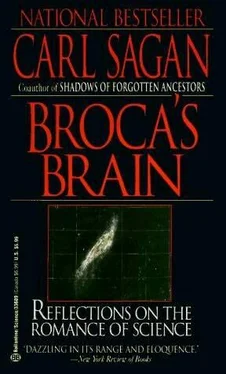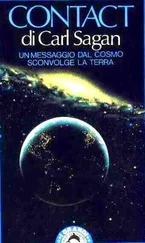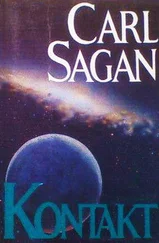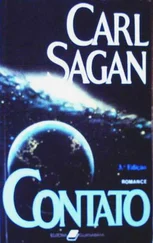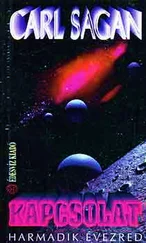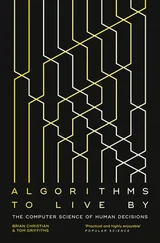Carl Sagan - Broca's Brain - The Romance of Science
Здесь есть возможность читать онлайн «Carl Sagan - Broca's Brain - The Romance of Science» весь текст электронной книги совершенно бесплатно (целиком полную версию без сокращений). В некоторых случаях можно слушать аудио, скачать через торрент в формате fb2 и присутствует краткое содержание. Жанр: Физика, на английском языке. Описание произведения, (предисловие) а так же отзывы посетителей доступны на портале библиотеки ЛибКат.
- Название:Broca's Brain: The Romance of Science
- Автор:
- Жанр:
- Год:неизвестен
- ISBN:нет данных
- Рейтинг книги:3 / 5. Голосов: 1
-
Избранное:Добавить в избранное
- Отзывы:
-
Ваша оценка:
- 60
- 1
- 2
- 3
- 4
- 5
Broca's Brain: The Romance of Science: краткое содержание, описание и аннотация
Предлагаем к чтению аннотацию, описание, краткое содержание или предисловие (зависит от того, что написал сам автор книги «Broca's Brain: The Romance of Science»). Если вы не нашли необходимую информацию о книге — напишите в комментариях, мы постараемся отыскать её.
Broca's Brain: The Romance of Science — читать онлайн бесплатно полную книгу (весь текст) целиком
Ниже представлен текст книги, разбитый по страницам. Система сохранения места последней прочитанной страницы, позволяет с удобством читать онлайн бесплатно книгу «Broca's Brain: The Romance of Science», без необходимости каждый раз заново искать на чём Вы остановились. Поставьте закладку, и сможете в любой момент перейти на страницу, на которой закончили чтение.
Интервал:
Закладка:
These ideas may cast some light on the origin and nature of religion. Most Western religions long for a life after death; Eastern religions for relief from an extended cycle of deaths and rebirths. But both promise a heaven or satori, an idyllic reunion of the individual and the universe, a return to Stage 1. Every birth is a death-the child leaves the amniotic world. But devotees of reincarnation claim that every death is a birth-a proposition that could have been triggered by perithanatic experiences in which the perinatal memory was recognized as a recollection of birth. (“There was a faint rap on the coffin. We opened it, and it turned out that Abdul had not died. He had awakened from a long illness which had cast its spell upon him, and he told a strange story of being born once again.”)
Might not the Western fascination with punishment and redemption be a poignant attempt to make sense of perinatal Stage 2? Is it not better to be punished for something-no matter how implausible, such as original sin-than for nothing? And Stage 3 looks very much like a common experience, shared by all human beings, implanted into our earliest memories and occasionally retrieved in such religious epiphanies as the near-death experience. It is tempting to try to understand other puzzling religious motifs in these terms. In utero we know virtually nothing. In Stage 2 the fetus gains experience of what might very well in later life be called evil-and then is forced to leave the uterus. This is entrancingly close to eating the fruit of the tree of the knowledge of good and evil and then experiencing the “expulsion” from Eden. [26]In Michelangelo’s famous painting on the ceiling of the Sistine Chapel, is the finger of God an obstetrical finger? Why is baptism, especially total-immersion baptism, widely considered a symbolic rebirth? Is holy water a metaphor for amniotic fluid? Is not the entire concept of baptism and the “born again” experience an explicit acknowledgment of the connection between birth and mystical religiosity?
If we study some of the thousands of religions on the planet Earth, we are impressed by their diversity. At least some of them seem stupefyingly harebrained. In doctrinal details, mutual agreement is rare. But many great and good men and women have stated that behind the apparent divergences is a fundamental and important unity; beneath the doctrinal idiocies is a basic and essential truth. There are two very different approaches to a consideration of tenets of belief. On the one hand, there are the believers, who are often credulous, and who accept a received religion literally, even though it may have internal inconsistencies or be in strong variance with what we know reliably about the external world or ourselves. On the other hand, there are the stern skeptics, who find the whole business a farrago of weak-minded nonsense. Some who consider themselves sober rationalists resist even considering the enormous corpus of recorded religious experience. These mystical insights must mean something. But what? Human beings are, by and large, intelligent and creative, good at figuring things out. If religions are fundamentally silly, why is it that so many people believe in them?
Certainly, bureaucratic religions have throughout human history allied themselves with the secular authorities, and it has frequently been to the benefit of those ruling a nation to inculcate the faith. In India, when the Brahmans wished to keep the “untouchables” in slavery, they proffered divine justification. The same self-serving argument was employed by whites, who actually described themselves as Christians, in the ante-bellum American South to support the enslavement of blacks. The ancient Hebrews cited God’s direction and encouragement in the random pillage and murder they sometimes visited on innocent peoples. In medieval times the Church held out the hope of a glorious life after death to those upon whom it urged contentment with their lowly and impoverished station. These examples can be multiplied indefinitely, to include virtually all the world’s religions. We can understand why the oligarchy might favor religion when, as is often the case, religion justifies oppression-as Plato, a dedicated advocate of book-burning, did in the Republic. But why do the oppressed so eagerly go along with these theocratic doctrines?
The general acceptance of religious ideas, it seems to me, can only be because there is something in them that resonates with our own certain knowledge-something deep and wistful; something every person recognizes as central to our being. And that common thread, I propose, is birth. Religion is fundamentally mystical, the gods inscrutable, the tenets appealing but unsound because, I suggest, blurred perceptions and vague premonitions are the best that the newborn infant can manage. I think that the mystical core of the religious experience is neither literally true nor perniciously wrong-minded. It is rather a courageous if flawed attempt to make contact with the earliest and most profound experience of our lives. Religious doctrine is fundamentally clouded because not a single person has ever at birth had the skills of recollection and retelling necessary to deliver a coherent account of the event. All successful religions seem at their nucleus to make an unstated and perhaps even unconscious resonance with the perinatal experience. Perhaps when secular influences are subtracted, it will emerge that the most successful religions are those which perform this resonance best.
Attempts at rationalistic explanations of religious belief have been resisted vigorously. Voltaire argued that if God did not exist Man would be obliged to invent him, and was reviled for the remark. Freud proposed that a paternalistic God is partly our projection as adults of our perceptions of our fathers when we were infants; he also called his book on religion The Future of an Illusion. He was not despised as much as we might imagine for these views, but perhaps only because he had already demonstrated his disreputability by introducing such scandalous notions as infantile sexuality.
Why is the opposition to rational discourse and reasoned argument in religion so strong? In part, I think it is because our common perinatal experiences are real but resist accurate recollection. But another reason, I think, has to do with the fear of death. Human beings and our immediate ancestors and collateral relatives, such as the Neanderthals, are probably the first organisms on this planet to have a clear awareness of the inevitability of our own end. We will die and we fear death. This fear is worldwide and transcultural. It probably has significant survival value. Those who wish to postpone or avoid death can improve the world, reduce its perils, make children who will live after us, and create great works by which they will be remembered. Those who propose rational and skeptical discourse on things religious are perceived as challenging the remaining widely held solution to the human fear of death, the hypothesis that the soul lives on after the body’s demise. [27]Since we feel strongly, most of us, about wishing not to die, we are made uncomfortable by those who suggest that death is the end; that the personality and the soul of each of us will not live on. But the soul hypothesis and the God hypothesis are separable; indeed, there are some human cultures in which the one can be found without the other. In any case, we do not advance the human cause by refusing to consider ideas that make us frightened.
Those who raise questions about the God hypothesis and the soul hypothesis are by no means all atheists. An atheist is someone who is certain that God does not exist, someone who has compelling evidence against the existence of God. I know of no such compelling evidence. Because God can be relegated to remote times and places and to ultimate causes, we would have to know a great deal more about the universe than we do now to be sure that no such God exists. To be certain of the existence of God and to be certain of the nonexistence of God seem to me to be the confident extremes in a subject so riddled with doubt and uncertainty as to inspire very little confidence indeed. A wide range of intermediate positions seems admissible, and considering the enormous emotional energies with which the subject is invested, a questing, courageous and open mind seems to be the essential tool for narrowing the range of our collective ignorance on the subject of the existence of God.
Читать дальшеИнтервал:
Закладка:
Похожие книги на «Broca's Brain: The Romance of Science»
Представляем Вашему вниманию похожие книги на «Broca's Brain: The Romance of Science» списком для выбора. Мы отобрали схожую по названию и смыслу литературу в надежде предоставить читателям больше вариантов отыскать новые, интересные, ещё непрочитанные произведения.
Обсуждение, отзывы о книге «Broca's Brain: The Romance of Science» и просто собственные мнения читателей. Оставьте ваши комментарии, напишите, что Вы думаете о произведении, его смысле или главных героях. Укажите что конкретно понравилось, а что нет, и почему Вы так считаете.
